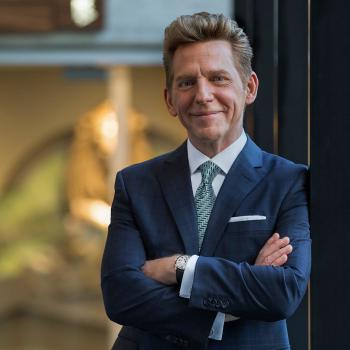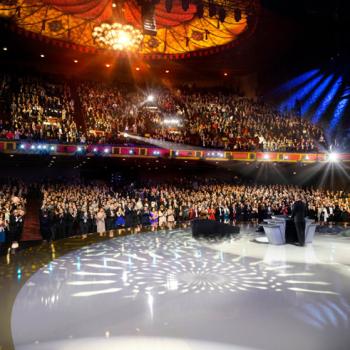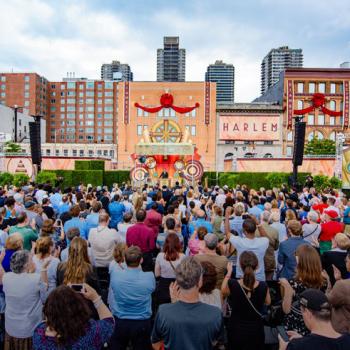I thought this 2012 article on Chick Correa from the Ottowa Citizen was particularly appropriate for a Scientology blog on International Jazz Day.
It’s two years old, but it is such a beautiful tribute to Chick and his relationship with Scientology Founder L. Ron Hubbard.
I’ve also added a YouTube video — a concert of Chick performing The Ultimate Adventure, an album to accompany the science fiction novel of the same title by L. Ron Hubbard. Performing in this video are Chick Corea – Piano; Tom Brechtlein – Drums; Rubem Dantas (Spanish) Percussion;
Jorge Pardo – Flute, saxophone; Carles Benavent – Electric bass, palmas.
Here’s the article:
It’s not often you hear the names Miles Davis and L. Ron Hubbard in the same sentence.
Unless Chick Corea is doing the talking. The jazz pianist credits Davis, the famously cranky jazz innovator, and Hubbard, the smooth-talking founder of Scientology, as the major influences on his music and his life.
Corea knows that had the two men met, Hubbard would almost certainly have rubbed Davis the wrong way. Just about everyone did.
But Corea, who played with Davis in the late ’60s-early ’70s and exchanged letters with Hubbard for 15 years until his death in 1986, says both men taught him the importance of breaking down barriers and going his own way.
“Freedom to communicate, and freedom to think how you want to think — to me that’s the area where artists operate,” says Corea. “I got that from Miles, and I learned it from Scientology.”
In an interview about his concert Wednesday at Casino du Lac Leamy in the Ottawa, his first visit to the Ottawa area in 16 years, Corea seems eager to talk about how Hubbard and Davis influenced his music and changed his life.
Especially Hubbard.
“Scientology has enabled me to understand and develop my own strengths and to write music more quickly,” he says. “It also helped me to become freer to create as I want to, not how others think I should.”
There’s certainly no denying Corea’s output or individuality. His fleet, elegant piano style and occasional bursts of flowery Spanish-tinged romanticism have become distinctive jazz signposts.
In the 40 years since his first recording as leader, Corea, 64, has turned out almost 100 albums, picking up 45 Grammy nominations and playing with the top names in jazz along the way.
His early-’70s work with the groups Circle and Return to Forever helped change the face of jazz, broadening the audiences for avant-garde and fusion styles and opening the door to cross-cultural influences a decade before the worldbeat wave of the ’80s.
Add in Corea’s trailblazing work on the electric piano and his hefty contributions to acoustic jazz, bebop and orchestral music, and it’s obvious why he’s considered, along with Herbie Hancock and Keith Jarrett, one of three most influential pianists of the jazz generation that came of age in the ’60s.
Looking back, Corea says that when he first heard about Scientology from another musician in 1968, he was unsure where to go next with his music, or how to make the most of his talents.
“I began to use L. Ron Hubbard’s ideas about artistic expression and communication to enhance my own abilities,” he says. “That was when I really began to compose and do my own thing.”
It was also about the time he joined Davis, playing electric piano on a pair of albums — In a Silent Way and Bitches Brew — that shocked fans and critics with a freewheeling exchange of jazz, rock and funk that owed more to Jimi Hendrix and Sly and the Family Stone than it did to anything in jazz’s past.
Corea saw in the trumpeter’s fearless determination to shed musical skins the type of free thinking he says he was also being encouraged to pursue through Hubbard’s writings.
“Miles didn’t care about labels and categories,” Corea says. “People used to say, ‘What’s he doing, he’s ruining his beautiful music with all those horrible sounds.’
“Well, today a lot of that criticism has turned into adulation, and we can see he opened doors for a lot artists, including me, by doing that. Scientology helped me to follow that path as well.”
Listening to Corea talk, there’s no reason to doubt his sincerity. Scientology has made him a better musician, he says with enthusiasm, as well as a better husband and a better friend. But when he’s asked about Scientology’s controversial aspects, Corea’s mood quickly sours.
The popular image of Scientology as an aggressive recruiter of the vulnerable, or a secretive organization that promotes a spaced-out new age philosophy while campaigning against psychiatric treatment, is a “lie and a distortion” spread by the media.
“Taking your idea of Scientology from newspapers is like learning about jazz from newspapers,” he says impatiently. “If you want to learn about jazz, you buy some Duke Ellington and John Coltrane records and you go to see some music played live. You go to the source.
“If you want to learn about Scientology, you read a book by L. Ron Hubbard, you go to a Scientology bookstore and talk to the people there. You observe with your own eyes and make up your own mind.”
As for Scientology’s strategy of cultivating entertainers to help popularize its ideas, Corea cuts off the question before it’s finished. Nor does he have anything to say about the disgruntled former Scientologists who urge boycotts of his music and concerts.
“I’m not sure where you’re going with this,” he says, more than a hint of exasperation creeping into his Boston brogue. He wonders if the questions be the same if he were Catholic.
Well, probably.
Corea has never made a point of separating his music from his 38-year involvement with Scientology, and it doesn’t seem out of place to ask about the link between the two.
His album covers offer “thank yous” to Hubbard. He has recorded two albums inspired by Hubbard’s science fiction writing and has been known to promote Scientology books and DVDs alongside his own CDs on the merchandise tables at concerts.
As a church representative, Corea has appeared before U.S. Congress to talk about religious persecution. For years, he sent his albums to Hubbard, and Hubbard sent him his own classically influenced compositions.
Not surprisingly, Corea’s name routinely appears on lists of celebrity Scientologists, usually toward the top along with Tom Cruise and John Travolta, actors the pianist considers friends.
For Corea, Scientology is a practical guide to everyday living. To outsiders, it can seem exotic and often sinister.
Scientology, which literally means “the study of truth,” and its substudy, Dianetics, were first developed in 1950 by Hubbard, until then known mainly as the author of dozens of pulp science fiction novels.
That year he published Dianetics: The Modern Science of Mental Health, which theorized that painful mental pictures of past events — from this life and innumerable former lives — continue to act as a hidden influence, causing unhappiness and psychosomatic ills.
Hubbard used the word “auditing” to describe techniques for confronting such memories and erasing their impact. Using an “e-meter,” a device similar to a lie detector, auditors try to free people from their mental blocks and achieve a state called “Clear.” From there, they can advance through various levels of “Operating Thetan,” Hubbard’s word for the soul.
Corea complains that critics usually fail to note that these methods are meant to be used in conjunction with the “non-religious, common sense precepts” that Hubbard developed to deal with daily matters such as eating well, staying clean, remaining faithful to a spouse and staying drug-free.
And although Corea says he’s never encountered difficulties from musicians wary of his beliefs, his statement contradicts saxophonist Joe Farrell’s often quoted account of his fallout with the pianist over “that Scientology shit” when the two played together in Return To Forever in the ’70s.
“Why should Scientology create problems?” Corea says. “Scientology is a strong promoter of religious tolerance. It’s ridiculous to say otherwise.”
Even so, Corea prefers working with musicians who share his ethics, even if they are not Scientologists. Which brings him to Wednesday’s concert, part of a month-long tour that reunites the pianist with two longtime friends, Brazilian percussionist Airto Moreira and bassist Eddie Gomez.
The tour marks the first time in 30 years Corea has played with Moreira, a Return To Forever bandmate. Gomez, most famously a member of the Bill Evans Trio for much of the ’70s, performed with Corea in the quartet he formed after the breakup of Return To Forever in the late 1970s.
As the tour name, Forever Returns, suggests, the concert will emphasize the Brazilian-influenced fusion-chamber jazz associated with Return To Forever’s early ’70s music. In that spirit, Corea plans to bring along a Fender Rhodes electric piano and mini-Moog to play with the piano.
“The idea is a simple thing — get together with two really old friends who play great and share some fun and music,” he says. “Nothing complicated. It’s a nice change.”








